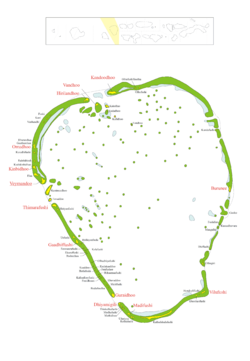Kolhumadulu Atoll
Thaa Atoll | |
|---|---|
 | |
 Location of Thaa in Maldives | |
| Country | Maldives |
| Corresponding geographic atoll(s) | Kolhumadulu |
| Location | 3° 34' N and 2° 11' N |
| Capital | Veymandoo |
| Government | |
| • Atoll Chief | - |
| Population | |
• Total | 8,901 |
| Letter code | N |
| Dhivehi letter code | Th (ތ) |
| • Number of islands | 66 |
| • Inhabited islands | Burunee * Dhiyamingili * Gaadhiffushi * Guraidhoo * Hirilandhoo * Kandoodhoo * Kinbidhoo * Madifushi * Omadhoo * Thimarafushi * Vandhoo * Veymandoo * Vilufushi |
| • Uninhabited islands | Bodufinolhu, Bodurehaa, Dhiffushi, Dhonanfushi, Dhururehaa, Ekuruffushi, Elaa, Fenfushi, Fenmeerufushi, Fonaddoo, Fondhoo, Fonidhaani, Fushi, Gaalee, Gaathurehaa, Hathifushi, Hiriyanfushi, Hodelifushi, Hulhiyanfushi, Kaaddoo, , Kadufushi, Kafidhoo, Kakolhas, Kalhudheyfushi, Kalhufahalafushi, Kandaru, Kani, Kanimeedhoo, Kolhufushi-1, Kolhufushi-2, Kudadhoo, Kudakaaddoo, Kudakibidhoo, Kurandhuvaru, Kuredhifushi, Lhavaddoo, Maagulhi, Maalefushi, Mathidhoo, Medhafushi, Olhudhiyafushi, Olhufushi, Olhufushi-finolhu, Olhugiri, Ruhththibirah, Thinkolhufushi, Ufuriyaa, Usfushi, Vanbadhi |
| Resort islands(*), airports(¤) and industrial islands are also considered uninhabited. | |
Kolhumadulu Atoll (also known as Thaa Atoll) is an administrative division of the Maldives. It corresponds to the natural atoll of the same name. The ancient name of the island was Kolhumaduva during the time of King Koimala who united all atolls of the Maldives under one kingdom for the first time.
Traditionally, Maldivians call this atoll simply Kolhumadulu, without adding the word atholhu at the end. Thaa is the code letters assigned to the atoll and is sometimes used by tourists to refer to the atoll itself.
The waters surrounding this atoll are good fishing areas and some islands house fish processing plants.[citation needed]
Archaeology
Kolhumadulu Atoll comprises thirteen inhabitant islands. They are; Burunee, Vilufushi, Madifushi, Dhiyamigili, Guraidhoo, Kadoodhoo, Vandhoo, Hirilandhoo, Gaadhifushi, Thimarafushi, Veymandoo, Kinbidhoo, and Omadhoo. There are important Buddhist archaeological remains in the island of Kinbidhoo, including a large ruined stupa. These were explored by the late Muhammad Ismail Didi. A report on the survey was published in the book Divehi Tārīkhah Au Alikameh.
Geography
The Atoll is the 21st Largest Atoll In the World. The shapes of the atoll closely resembles the shape of its southern neighbor Haddunmathi Atoll, except for the projection of the reef at the NE corner of Haddunmathi Atoll (Isdhū Muli). This Atoll marks the end of the east–west divide of the Maldives Atolls between Kaashidhoo Kandu and Kudahuvadhoo Kandu.
2004 Tsunami
Some islands in Kolhumadulu Atoll were severely affected by the 2004 Tsunami. Particularly Vilufushi, The island faced the most casualties out of all the other islands in the Maldives. The 1900 Citizens of the island were displaced to Burunee in the same atoll.[1] Kinbidhoo was also severely affected by the tsunami.
References
- ^ "Maldives: Government's claim of providing housing for tsunami victims disputed - Maldives | ReliefWeb". reliefweb.int. 2017-01-05. Retrieved 2023-10-21.
- Divehi Tārīkhah Au Alikameh. Divehi Bahāi Tārikhah Khidmaiykurā Qaumī Markazu. Reprint 1958 edn. Malé 1990.
- Divehiraajjege Jōgrafīge Vanavaru. Muhammadu Ibrahim Lutfee. G.Sōsanī.
- Xavier Romero-Frias, The Maldive Islanders, A Study of the Popular Culture of an Ancient Ocean Kingdom. Barcelona 1999.
- Ministry of Atolls, Maladives: http://www.atolls.gov.mv/islands.asp?atoll_letter=N&islandcode=N12&atolldhiv=Thaa[permanent dead link]
2°22′N 73°07′E / 2.367°N 73.117°E

